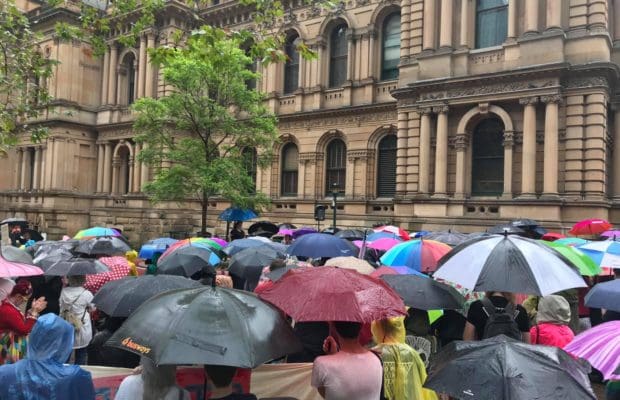Content warning: queerphobia.
In the aftermath of marriage equality, little over two years ago, the Liberal Party has been eager for retribution. After the “Yes” vote won, Prime Minister Malcolm Turnbull set up a so-called expert panel to examine whether Australian law adequately “protects freedom of religion”. This was an explicit attempt to undermine equality for the LGBTI+ community and placate the far right of his party. This panel, chaired by “No” campaigner Philip Ruddock, then set out 20 recommendations on how to better legislate these religious freedoms.
The recommendations laid out by Ruddock, published mid-2018, included a number of clarifications regarding discrimination law, especially in relation to schools and the celebration of marriages. These included religious schools receiving expanded rights to refuse students and the clarification that religious exceptions to anti-discrimination law apply for marriage celebrants.
While the panel didn’t find that religious freedoms were threatened in Australia, 14 of these recommendations were accepted in late 2018, and the first exposure draft of the Religious Discrimination Bill was released in August 2019. After facing widespread criticism, largely from religious groups who demanded further ‘protections’, a second exposure draft was released in December 2019, which continues to have concerning impacts on many areas, including education, employment, and medical services. Despite the complicated process of enacting the changes, Attorney-General Christian Porter has assured the public that the bill is still on the agenda for the current government.
One of the most worrying aspects of the draft bill is that it establishes a right to make a “statement of belief”. This right overrides the anti-discrimination laws of all eight states and territories, as well as all federal anti-discrimination laws, including the Race Discrimination Act and the Sex Discrimination Act. It will allow people to make discriminatory statements such as Israel Folau’s infamous comment that “all homosexuals should go to hell”, by protecting them from legal ramifications as long as it can be claimed as a “statement of belief”.
Another problematic section of the Bill involves an amendment to the Marriage Act, in creating a definition of marriage called a “relevant marriage belief”, which can be held by individuals or institutions. These beliefs include that marriage is exclusively between a man and a woman, and that marriages outside of this definition are harmful to children raised in them and contrary to human society. The Bill would give legal protection to institutions or individuals who object to same-sex marriage, in part by making it unlawful for Federal, State, or Territory governments to limit funding to an entity on the ground of holding a “relevant marriage belief”.
The Bill also contains various other provisions that go far beyond the scope of existing discrimination laws. Section 8 prohibits any rule imposed on an employer on a health practitioner that would require them to perform services to which they have a religious objection. This could allow doctors to refuse to perform abortions or to provide any healthcare for LGBTIQ+ people or families. This is of particular note when considering Indigenous Australians living in remote communities, where equitable service provision is already a challenge. This Bill places the rights of the practitioner over the rights of the patients, and its reliance on the discretion of health providers promotes inconsistent applications. If a patient in a remote area is refused a health service, the next closest practitioner may be an inhibiting distance away, which is especially likely given that religious organisations are the sole practitioner in many areas of the Northern Territory.
It will also enshrine the ability of religious institutions to expel students and fire staff for being gay or for even expressing pro-equality opinions – a dire situation that is forcing teachers and students back into the closets.
Labor is unlikely to support the bill in its current form, but has previously pledged to work with the Coalition to introduce some form of religious protections into Australian law. In January 2020, Albanese worked in consultation regarding the bill with LGBT+ community groups and activists, as well as unions, human rights, women’s groups, and the Australian Medical Association.
Prior to the COVID-19 pandemic, there have been protests against the bill around Australia, in Sydney being led by Community Action for Rainbow Rights (CARR). These protests are a continuation of a long history of queer activism and demonstrate that queer people, and others impacted by such blatant attacks on anti-discrimination law, are not going to stay quiet. As the famous Stonewall slogan goes, “Out of the closet and into the streets!”





